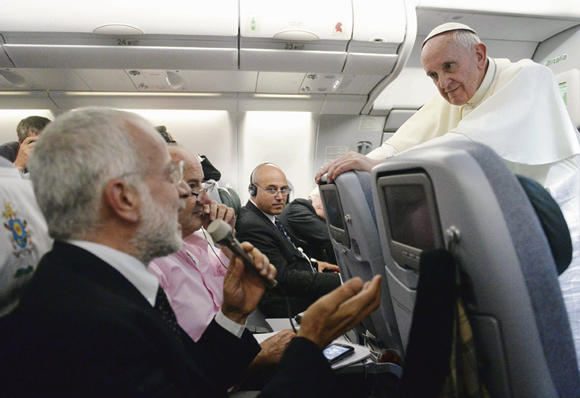by Cindy Wooden

ABOARD THE PAPAL FLIGHT FROM BRAZIL (CNS) – Pope Francis said he was responding to the clear wishes of the College of Cardinals when he set up commissions to study the Vatican bank, Vatican financial and administrative procedures and the reform of the Roman Curia.
The pope also said he knows people have spoken about some kind of “gay lobby” at the Vatican protecting certain priests by threatening to blackmail others. The pope said the “lobbying” is what is worrisome.
Pope Francis held his first news conference July 28, shortly after the Alitalia flight taking him back to Rome departed from Rio de Janeiro. He answered questions from 21 journalists over a period of 80 minutes. The questions were not submitted in advance, and no topics were ruled out of bounds.
Asked about the Vatican bank, Pope Francis said he does not know what will become of the Institute for the Works of Religion, which is the formal name of the scandal-plagued bank. He has appointed an outside commission and is involved in discussions about how to organize it, “how to restore it, reformulate it.”
As for the wider reform of the Roman Curia, Pope Francis said everything he has done so far flows from the concerns and suggestions raised by the College of Cardinals during the meetings they held before the conclave that elected Pope Francis in March.
The cardinals, he said, expressed “what they wanted of the new pope – they wanted a lot of things,” but a key part of it was that the Vatican central offices be more efficient and more clearly at the service of the universal Church.
“There are saints who work in the Curia – cardinals, bishops, priests, sisters, laity; I’ve met them,” he said. They include those who work full-time, then do volunteer work, feed the poor and help out in parishes on weekends.
The media only writes about the sinners and the scandals, he said, but that’s normal, because “a tree that falls makes more noise than a forest that grows.”
Soon after his nomination was announced, an Italian magazine published a story claiming Msgr. Battista Ricca had been sent away from a nunciature in Latin America when it was learned that he had a male lover.
Pope Francis told reporters, “I did what canon law said must be done, I ordered an ‘investigation brevia,’ and this investigation found nothing.”
The pope continued by talking about how “many times in the church, outside this case, but also in this one, we go searching for the sins – of one’s youth, for example – for publicity. I’m not talking about crimes here – the abuse of a minor is a crime – but of sins.”
“But if a person, whether a layperson, priest or sister, goes to confession and converts, the Lord forgives. And when the Lord forgives, he forgets. This is important,” he said, because those who want the Lord to forget their sins should forget those of others.”
